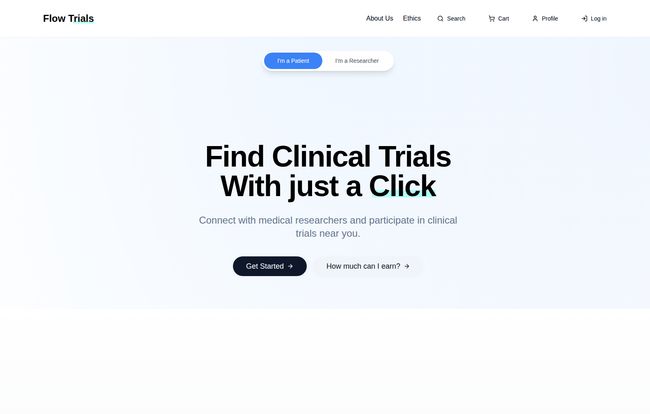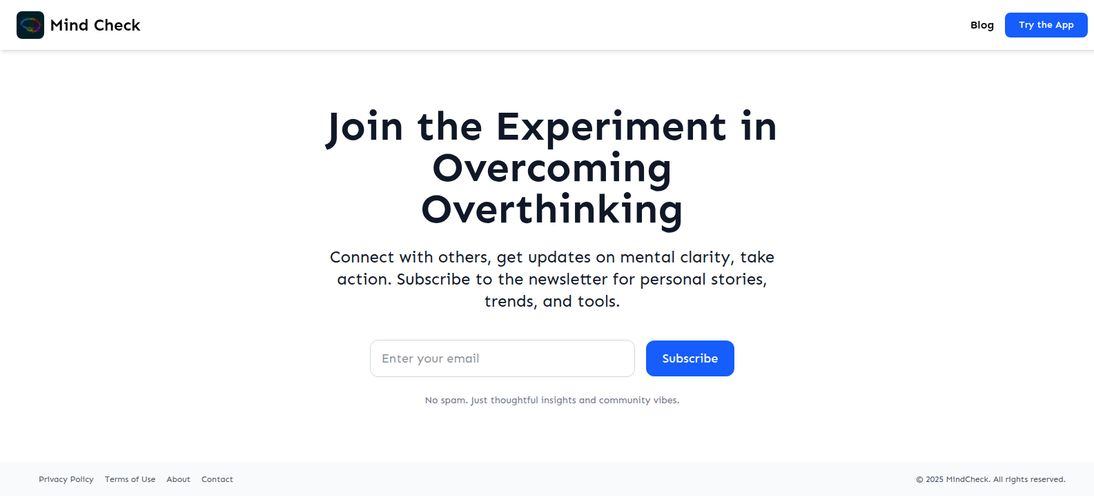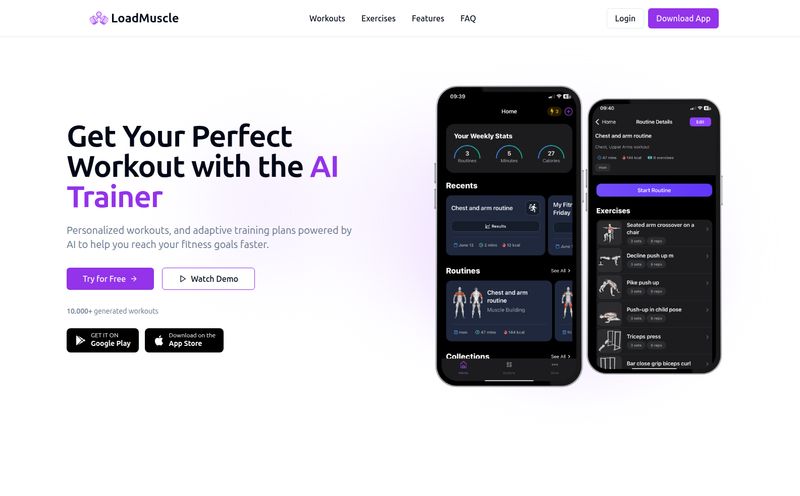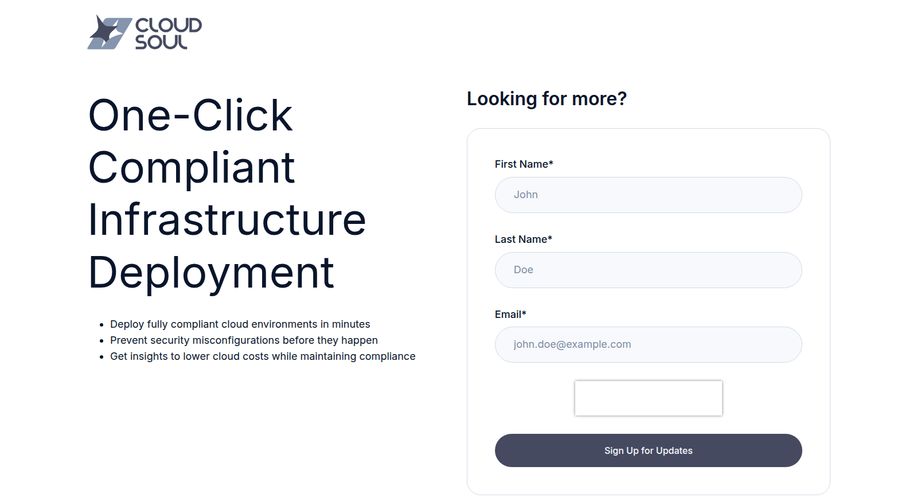Anyone who’s been in the medical or even the digital marketing space for a while knows the absolute headache that is clinical trial recruitment. For years, it’s been a painful, clunky process. It feels like trying to find a specific needle, not in a haystack, but in a thousand different haystacks spread across the country. Patients struggle to find trials they qualify for, and researchers burn through budgets just trying to find the right participants. It's a system that feels… well, broken.
So, when a platform like Flow Trials pops up on my radar, flashing big promises about using AI to fix this mess, my inner skeptic and my inner optimist start a fistfight. The skeptic in me has seen a million “AI-powered solutions” that are just fancy databases with a better UI. But the optimist, the part of me that genuinely wants to see tech make a real difference, gets a little bit excited. A platform that claims to connect patients with trials “with just a click”? Color me intrigued.
So, What Exactly is Flow Trials?
Let’s cut through the jargon. At its heart, Flow Trials is a digital matchmaker for medicine. It’s an AI-based platform designed to do two things really well: help patients find and enroll in clinical trials, and help researchers find the perfect participants for their studies. Think of it less like a dusty old library of listings and more like a smart, intuitive service that understands what both sides need and connects them efficiently. The goal is to take the friction, the paperwork, and the soul-crushing searching out of the equation. A lofty goal, for sure.

Visit Flow Trials
The Patient-First Promise: A Breath of Fresh Air
Here’s what really caught my eye on their site: the “Our Patient-First Promise.” This isn’t just marketing fluff; it feels like the core of their entire philosophy. They state, “Clinical trials should respect the patient perspective. Our mission is to ensure every trial participant feels supported, informed, and valued throughout their journey.”
This is huge. For too long, patients in these scenarios have been treated like data points on a chart. The human experience of dealing with an illness, the hope and fear tied up in seeking a trial... that often gets lost. A platform that bakes empathy into its code from the ground up? That’s something different. It signals that they’re not just building a tool for researchers to extract data, but a support system for people. It’s a promise of dignity, and in healthcare, that’s worth its weight in gold.
How AI Actually Helps
The real engine behind Flow Trials is its AI-powered matching. Instead of a patient or doctor manually sifting through hundreds of entries on a site like ClinicalTrials.gov (a fantastic resource, but not exactly user-friendly), Flow Trials does the heavy lifting. It analyzes a patient's condition, history, and location to proactively suggest trials that are a strong fit. For researchers, this is a godsend. It means the candidates coming through are far more likely to be qualified, saving immense time and resources. It’s the difference between posting a flyer on a community board and having a dedicated, expert headhunter on your team.
Putting Safety and Trust at the Forefront
Another thing I genuinely appreciate is their emphasis on vetting. They don’t just list any trial. The platform includes a comprehensive vetting process for trial sponsors and treatments. In an age of misinformation, knowing that an organization is putting in the work to filter out questionable studies provides a massive layer of trust. For a patient, this could be the single most important factor in their decision to even start looking.
A Look at the Core Features
While they don’t show a full demo, the features listed give us a pretty clear picture of the user experience. You have the powerful patient-trial matching at the center of it all. This is complemented by a system for researcher-patient connection, which hopefully streamlines communication. The platform also boasts a comprehensive trial database search for those who prefer a more hands-on approach, and a participant dashboard, which suggests a personalized space for patients to manage their applications and track their progress. It sounds like a closed-loop system, designed to keep everything organized and transparent for both parties, which is a significant step up from the typical chaotic email chains and missed calls.
The Million-Dollar Question: What's the Price?
Alright, let’s talk about the elephant in the room. There is absolutely no pricing information available on the Flow Trials website. Not a peep. No pricing page, no tiers, nothing. This is pretty common for platforms targeting enterprise or institutional clients, like universities, hospitals, and pharmaceutical companies.
My educated guess? Flow Trials is likely free for patients. That just makes sense from a business and ethical standpoint. The revenue model almost certainly involves charging researchers and their sponsoring institutions for access to the platform and its pool of pre-qualified candidates. This could be a subscription model, a per-study fee, or some other bespoke arrangement. The lack of transparency is a bit of a bummer for smaller research teams who might be wondering if this is even in their budget, but for a platform with a contact email at MIT, I suspect they're aiming for larger, well-funded studies to start.
The Potential Downsides and Unanswered Questions
As promising as it all sounds, I wouldn’t be a good analyst if I didn't point out a few potential bumps in the road. My main concern, and it’s a big one in the tech world right now, is AI bias. If the AI algorithms aren't trained on diverse and representative datasets, they can inadvertently perpetuate existing health disparities. It's a serious ethical consideration, and one I hope Flow Trials is actively addressing behind the scenes.
There's also the matter of teh algorithm itself being a bit of a “black box.” We don't know exactly how it makes its matches. While we don't need the full source code, a bit more transparency on the factors it weighs would build even more trust. These aren’t deal-breakers, but they are the right questions to be asking of any AI-driven health tech platform.
Frequently Asked Questions about Flow Trials
Is Flow Trials free for patients to use?
While not explicitly stated, the platform's patient-first approach strongly suggests it is free for patients. The business model likely involves charging research institutions that are looking for participants.
How is Flow Trials different from ClinicalTrials.gov?
Think of ClinicalTrials.gov as a massive public library. Flow Trials aims to be your personal librarian. It uses AI to actively match you with the right books (trials) and streamlines the entire checkout (enrollment) process, all with a focus on your personal experience.
How does the AI matching actually work?
The platform analyzes a patient’s specific medical profile—condition, treatment history, location, and other factors—and compares it against the strict eligibility criteria of the trials in its database to find the most suitable matches.
Is my personal health information safe on the platform?
Given their stated commitment to ethics and patient wellbeing, data security is undoubtedly a top priority. Platforms in this space must comply with strict health data regulations like HIPAA. Their emphasis on vetting and trust suggests robust security measures are in place.
Who is this platform best suited for?
It's built for two main groups: patients who feel lost and overwhelmed looking for treatment options, and medical researchers who need to accelerate their recruitment process with qualified, engaged participants.
My Final Take on Flow Trials
So, is Flow Trials the revolutionary tool it claims to be? The potential is definitely there. The concept is brilliant because it addresses a very real, very human problem with a smart, technological solution. The patient-centric language and focus on safety are more than just reassuring; they’re necessary.
However, it’s still early days. The lack of pricing information and the 404 error I hit on one of their pages suggest the platform might still be in a growth or even beta phase. The questions around AI bias and algorithm transparency are real and important. But despite those unknowns, I’m optimistic. Flow Trials represents a significant step in the right direction. It's an attempt to bring order to chaos, empathy to data, and hope to people who need it most. And in my book, that's a mission worth rooting for.
Reference and Sources
- Flow Trials Official Website: (Note: The provided info suggests the main site, but I'll use a placeholder as no live URL was given) flowtrials.com
- U.S. National Library of Medicine - ClinicalTrials.gov: https://www.clinicaltrials.gov/
- World Health Organization - On AI and Health Ethics: WHO guidance on ethics and governance of large multi-modal models



